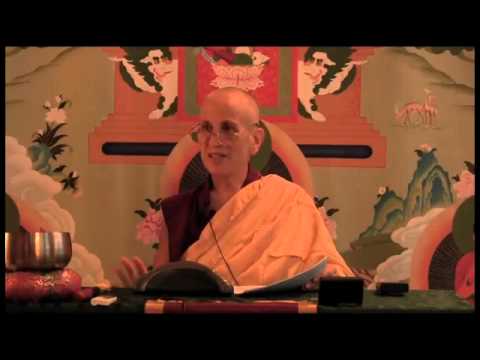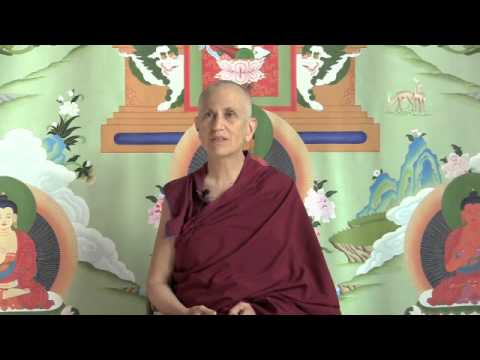Criteria of trust
Criteria of trust
Part of a series of short Bodhisattva’s Breakfast Corner talks on the topic of trust.
- Examining the criteria we use for trusting someone
- We have different roles in relationship to others, and should trust accordingly
Criteria of trust (download)
The topic of trust has come up a bit in the community from time to time, and I thought it might be good to talk a little bit about it, and to ask ourselves what are the criteria that we use to decide whether we trust somebody. For example, to trust somebody, must we like them? If we like somebody, do we automatically trust them? If somebody does something we don’t like, does that mean they’re untrustworthy? I think there’re a lot of things to really consider here, because there are different situations.
For example, when you get in a plane, you trust the pilot with your life. You don’t even know the pilot. Sometimes, we trust people we don’t even know. Or maybe you know the pilot, but you don’t like them as a person, but you know they’re a good pilot. You still trust them. Or you go to the doctor, and the doctor tells you something you do not want to hear at all, like you have to have surgery, or you have to take this horrible medicine. If the doctor tells you something that you don’t like to do, and you don’t like to hear, does that mean that you stop trusting the doctor? I hope not.
When you’re a parent and you’re guiding your child, sometimes you have to do things that your child doesn’t like. When we were children, did we stop trusting our parents when they did certain things we didn’t like? Sometimes, if what they did was really abusive, then yes, we did stop trusting them. Other times, when they did some things we didn’t like, but we managed to work our way through. And I know many of those situations I look back on now, and I’m very glad my parents did those things. I trusted them to bring me up to be an adult who can function in the world.
What I’m getting at is, we really have to look at what are the conditions and criteria for trusting somebody, because if we use the wrong criteria, we could really wind up in a mess. For example, if every time we like somebody, we trust them in every single way, that’s not terribly wise, is it? People have different capabilities, different qualities, so we have to see in what ways do we trust different kinds of people. Just liking somebody isn’t necessarily a proper criteria for trusting them. Somebody might be a very pleasant person to be around, very funny, very amusing, we may enjoy their company, but we’re not going to give them our money. Or we may not invite them to live in our home. We may like somebody very much, but not trust them in certain areas. Like I said, there may be people we don’t like, that we trust a lot. You may know the pilot and not like them, but you trust them.
I think that the proper criteria for trusting somebody in particular areas, is do they know what their responsibility in that role is, and are they fulfilling that responsibility, because we all have different roles in relationship to each other. Does that person know what their role is, first of all, what the things they are supposed to be good at doing are? Second of all, are they carrying out that role in a proper way in regards to us? I think that’s the proper criteria. Not so much, do we like them, do they do what we like, do they say what we want, because the basic thing is, if we stop trusting every person who does something that we don’t like, or says something that we don’t like, who are we going to trust? No one. At some time or another, everybody will say something we don’t like or do something we don’t like, right? This is samsara.
Even when the Buddha was alive, he said things that his disciples didn’t like. He scolded his disciples. He told them not to do certain things that they very much wanted to do. The disciples got angry at him. What kind of karma do you create there? So you see, even the Buddha, who’s really trustworthy, some people didn’t trust because they weren’t using the right criteria. They were using the criteria of, is this person telling me what I want to hear?
So if we go to a doctor, and their responsibility is to heal us, but instead they tell us what we want to hear: “There’s a tumor there, but it’s nothing, you don’t need to have surgery. You don’t need to take those awful pills. It’s nothing.” Then you die two months later. You may have trusted that doctor, but he actually wasn’t very trustworthy. Whereas a doctor who tells you lots of things you don’t want to hear may be the one who’s going to cure you. So we just have to think about these kinds of things, and not let our self-centered mind interfere with knowing who to trust in what situations.
Venerable Thubten Chodron
Venerable Chodron emphasizes the practical application of Buddha’s teachings in our daily lives and is especially skilled at explaining them in ways easily understood and practiced by Westerners. She is well known for her warm, humorous, and lucid teachings. She was ordained as a Buddhist nun in 1977 by Kyabje Ling Rinpoche in Dharamsala, India, and in 1986 she received bhikshuni (full) ordination in Taiwan. Read her full bio.


